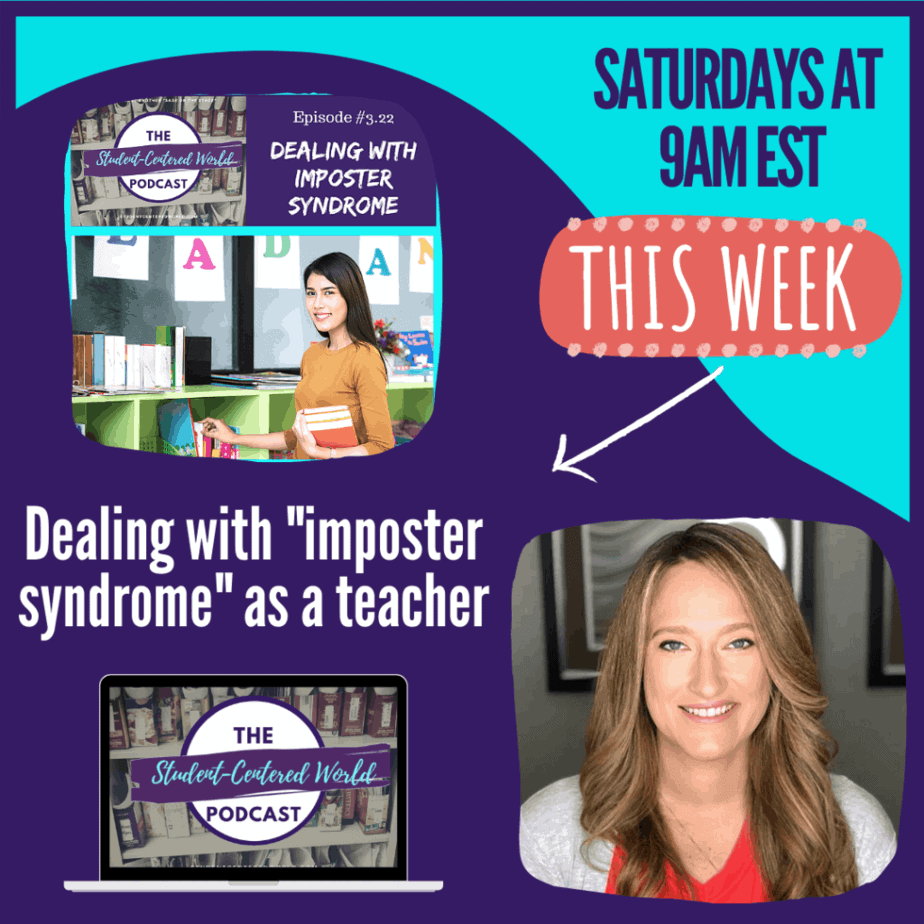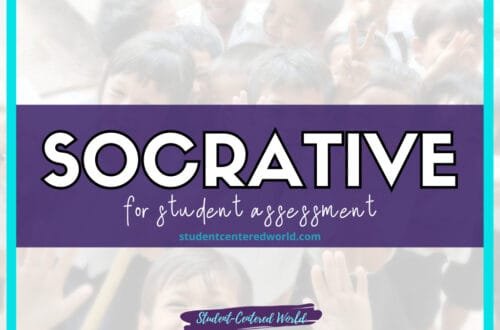Dealing with Imposter Syndrome as a Bold, 21st Century Teacher
Click above to listen to this podcast episode. Below is the transcript for Student-Centered World Podcast Episode 38: “Dealing with ‘Imposter Syndrome’ as a Teacher“
Hey friends, and welcome to another wonderful week of your favorite podcast, the Student-Centered World podcast. So, I wanted to talk to you guys about something that I know of in the business world that is directly relatable to the teaching world. Now, so often we don’t hear the two overlap. But there is this term that I hear over and over again in the business world that every time I hear it, I think of teachers and what we do to ourselves. So, I wanted to talk about that today to see if you are doing this to yourself, and what you can do to change it.
Welcome to the Student-Centered World podcast where we talk about all things hands-on teaching and keeping your energy and sanity in the classroom. This teacher turned consultant is making it her mission to help as many teachers as possible become the best version of themselves and keep their passion for teaching on fire. It’s her hope that we never forget why we desire to have a passion for educational progress. This is Student-Centered World, and this is Jenn Breisacher.
So, as you know, I am a teacher by trade, but I have an online business, which is Student-Centered World. In the online business world, there is this concept called imposter syndrome. It’s that people who are often just starting out in business, but sometimes have been in it for a little while, kind of feel a little bit inferior, like who am I to be teaching somebody this? Or I’m sure there’s somebody out there that knows so much more about this topic than I do.
Why would somebody come to me for business when they can go to somebody else, and so on and so forth. And as a business owner, I understand that concept but in listening to it and hearing about it, and hearing some of the top online business gurus talk about it, I realized that there’s so much of this in teaching. I wanted to talk about it a little bit today.
So, in thinking about it that way, you might be like, well, I don’t understand. We’re all teachers but have you ever had a moment where somebody else has done something and it has been awesome. It could have been a project, or you know, they were able to pull off an assembly or some type of a presentation, and you just think, wow, and there’s a part of you that even remotely thinks I could never do that, or they’ve got way more motivation than I do or just something that puts that person ahead of you in your thoughts.
That right there is imposter syndrome. That is one of the most negative internal conversations we can have without actually realizing it.

So, every single teacher is capable of teaching their students. of reaching their students, of differentiating for their students, of helping the kids that are struggling and challenging the kids that are doing really, really well, so on and so forth. But a lot of people think that it’s not possible to do all of that, that there are not enough hours in the day. That we don’t have enough time, that we don’t have enough resources.
While there is a lot of truth to that and I don’t have to even explain that because you know, and I know that’s how things are in education. There’s no saying that you can’t find a way to do that.
I say that because when I made the switch to student-centered learning and now that I train people in making the switch to student-centered learning, it finds ways to not only be able to check off all of those boxes, almost every single day, I say almost because every once in a while you’ve got you have a day and no matter what technique you use, that’s going to happen. No matter what kids you have in your classroom, that’s going to happen. But it makes you the person that other people look at.
They wonder, how do they do it? How are they able to get these kids all engaged? How are they able to get their test scores up so much? How are they able to have the behavior issues lessened? How are they able to know which kids are struggling? That kid that never ever talks. How are they able to figure that out? How are they still challenging these other kids at the same time helping the kids that are struggling?
All of that is possible in a student-centered classroom. But so many times we negatively talk to ourselves because we fall under this teacher imposter syndrome.
Yeah, well, so and so down the hallway can do it, but they have different kids than I do, or they have more time because they don’t have X, Y, and Z going on. Imposter syndrome in teaching is what I like to call the yeah buts and I know you’ve heard me say it before. If not, I’ll explain it right here. It’s, I would do XYZ but maybe this works but… You sit there and you acknowledge that yes, this is great.
Yes, this is good. Yes, this could work, however, and I call it the attack of the Yeah buts because you’re finding the negative pieces. Now, I’m not saying that every single thing is always possible. We know that sometimes we try hard and things don’t work out for a variety of reasons and a lot of times it is out of our control.

However, that doesn’t mean that people shouldn’t try. That doesn’t mean that it’s definitely impossible. That doesn’t mean that you should give up before you even get started because if you look at somebody else who is doing something, who is able to accomplish something who has mastered student-centered learning we’ll say. Say that would never work for me, or I couldn’t do that, or good for them, but they’re obviously XYZ. Yeah, but. Yeah, but, etc., etc.
You’re dealing with teacher imposter syndrome.
You’re saying that you are lesser than this other person because of all of these reasons. That’s simply not true. We’re all teachers, we’re all here to teach our students we want the aha moments, we want the smiles, we want all the good. Sometimes with the good comes bad. That’s just how it is pretty much in any profession you go into. I don’t know what profession that people don’t have bad days and they don’t have difficult clients or patients or whatever.
There are going to be bumps in the road but that doesn’t mean that you’re not capable of making the changes and making the decisions and making the tweaks and changing the mindset that will make it better, that can make you like that teacher down the hall, that can make you a person who understands and accepts and executes really well student-centered learning. If you think you can’t, or if you know that you can’t, that’s teacher imposter syndrome.
That’s you saying that even if somebody else can do it, you can’t, or you shouldn’t, or you’re not worthy of giving it a shot. That’s not true. The more tired you are in teaching, the more exhausted and feeling like on that edge of burnout and questioning is this where you’re meant to be? Should you keep doing this? Do you want to come back next year? Those are all prime-time examples of switching to a student-centered model because it helps turn all of that around.
I can’t tell you, the teachers that I’ve spoken with, that I have helped train in this method that changes completely.
Now sometimes you are in a toxic school environment, I have a podcast from last season that does talk about if you are in a toxic school and sometimes you can’t get ahead in a place like that. Maybe you should look to see if you can prove your craft elsewhere. That’s on you to decide what your options are. Again, you can go back to that other podcast. I can link it in the show notes to take a listen to what your real tangible options are in that scenario.
But if that isn’t the situation, and it’s just normal school education, bureaucratic nonsense that you’re dealing with, that we all kind of deal with on one level or another this makes it easier, and you can do it and you are able to do it and you are worthy of doing it.
You are worthy of doing things in the classroom that are going to make your life easier and less stressful, and have the people turning and asking you how you’re doing it. So, if you can really dive deep and think about it and think about what your hang-ups are here, is it imposter syndrome?
Is it you thinking that you can’t or that you shouldn’t, or that you’re not worth it. Because if another teacher out there is able to do it with similar students or students that are in a more negative position than you or that are in parallel positions. If they can do it, you can do it and there is a really good chance that you might even be able to do it better.
So, I want you to think about that. Is this something that can make your life better and if it is we should definitely chat about it more? Again, as always, you can reach out to me, admin@studentcenteredworld.com. You can join the mastermind Facebook group that I talked about, Student-Centered World mastermind. You can look it up on Facebook, it’ll pop right up. You can reach out on Instagram and Facebook, always willing to talk.
But I want you to take this with you this week and even if you have to think about it before you answer that question, just go through your week, and observe yourself, have a little bit of an out of body experience of how you’re viewing others, how you’re viewing yourself, what that inner self dialog is, and see if you’re dealing with imposter syndrome. Let’s talk about a way that you can move on past that. So, with that, enjoy the rest of your day.
Stop Driving the Teacher Struggle Bus
Are you struggling with student engagement, apathy, or keeping your class on track?
💫💫 There’s hope! 💫💫
Join my free teacher workshop “Choosing Choice” and in just 60 minutes, you’ll craft a practical plan to revitalize your teaching. Discover the magic of student choice in boosting engagement, gain quick implementation ideas, and explore strategies for year-long success.
Unlike overwhelming workshops, my approach guides you in real-time, providing more classroom options, reducing stress, and giving you more personal time.
Plus, you’ll earn a 1-hour professional development certificate and have 7 days of access.
Don’t miss this chance to transform your teaching; click below to secure your spot now!





